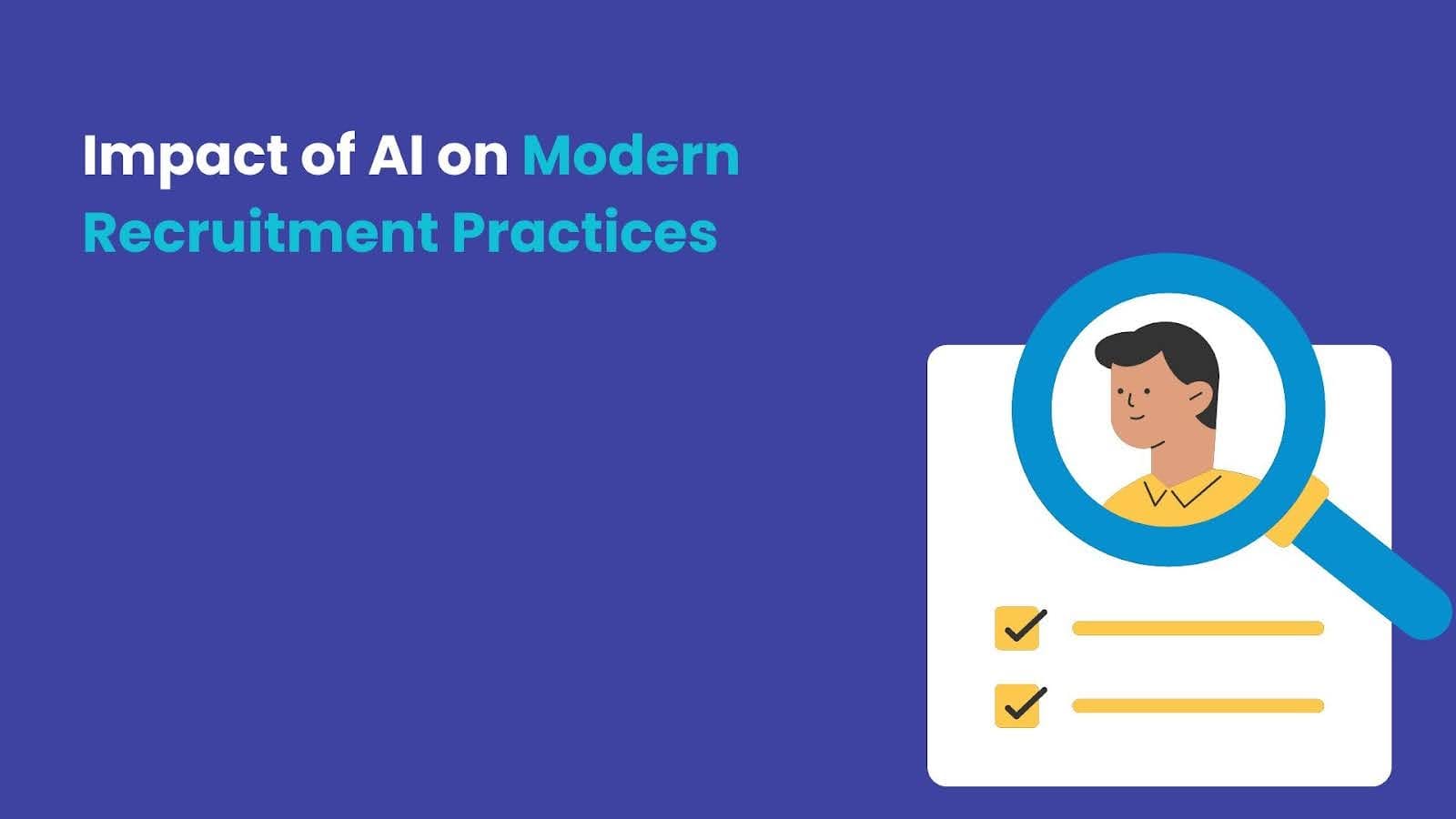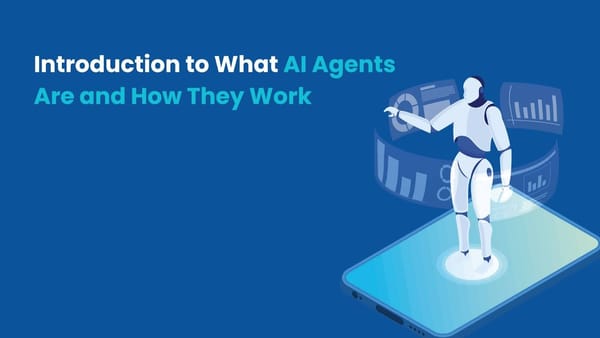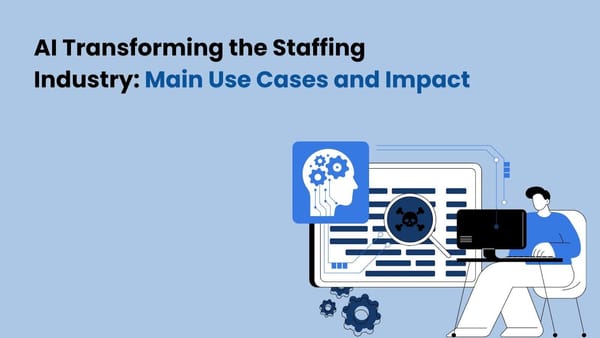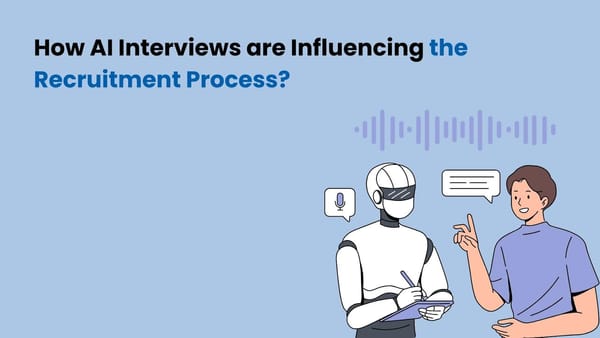The hiring practices of companies have significantly evolved recently due to the increasing use of AI in recruitment.
Recruitment has always been a crucial part of any business. However, the methods used to find and assess talent have dramatically evolved over the years. The introduction of Artificial Intelligence (AI) into the recruitment process is one of the most significant changes in recent times. But what exactly is the impact of AI in the recruitment process, and how is it shaping the future of hiring?
AI has revolutionized how companies attract, assess, and hire candidates. From automating routine tasks to improving decision-making, AI tools are transforming every stage of the recruitment process. Whether you are a recruiter looking to streamline your hiring process or a job seeker wondering how AI might affect your chances, understanding the impact of AI on recruitment is essential.
In this blog, we will explore the profound impact AI has had on recruitment practices, focusing on the ways AI can make hiring more efficient, fair, and effective.
Let’s look at how AI is transforming the recruitment process and improving hiring practices.
How AI is Changing the Recruitment Process
The recruitment process, once manual and time-consuming, has been transformed by AI technology. AI is now used in several areas of recruitment to enhance efficiency, reduce bias, and ensure a more seamless experience for both recruiters and candidates. Here are some of the most notable ways AI is changing recruitment practices:
1. Streamlining Candidate Sourcing
One of the first stages of the recruitment process is sourcing candidates. Traditionally, this task required recruiters to manually sift through resumes, LinkedIn profiles, job boards, and referrals. AI has streamlined this process by automating candidate sourcing.
AI-powered tools like Tidyhire and LinkedIn Recruiter use machine learning algorithms to search through large databases of resumes and profiles, automatically identifying candidates that match specific job descriptions. These tools can filter through hundreds, or even thousands, of applications in a fraction of the time it would take a human recruiter.
Impact of AI:
- Time-Saving: AI drastically reduces the time recruiters spend on sourcing candidates by automatically shortlisting profiles based on qualifications, skills, and experience.
- Wider Talent Pool: AI can scan multiple platforms and databases, expanding the talent pool and helping companies find candidates they may not have otherwise come across.
2. Enhancing Resume Screening
Traditionally, resume screening has been a time-consuming and manual process. Recruiters would spend hours reviewing each resume and assessing if a candidate was a good fit for the position. This is where AI has made a significant impact.
AI-powered resume screening tools use natural language processing (NLP) and machine learning algorithms to analyze resumes, instantly identifying key skills, qualifications, and experience that match the job description. These tools can assess the language used in resumes and identify whether a candidate has the right qualifications without the need for a human to go through each resume individually.
Impact of AI:
- Increased Efficiency: AI can process resumes in a matter of seconds, allowing recruiters to focus on the most promising candidates.
- Reducing Human Bias: AI tools are designed to eliminate bias by focusing purely on skills, qualifications, and experience, rather than factors like gender, age, or educational background.
3. Automating Candidate Screening and Assessments
AI-powered platforms can also automate candidate screening by administering initial assessments or pre-employment tests. These tests are customized to assess a candidate's skills, cognitive abilities, and even personality traits.
For example, AI tools like Codility for technical roles or Pymetrics for behavioral assessments use machine learning algorithms to evaluate a candidate’s problem-solving abilities, cognitive flexibility, and other key traits necessary for the role.
Impact of AI:
- Faster Screening: AI can run initial assessments automatically, saving recruiters from having to manually assess test results or interview candidates in the early stages.
- Better Matchmaking: AI tools provide insights into whether a candidate is likely to succeed in a particular role, based on the match between their skills and the requirements of the job.
4. Improving Candidate Engagement and Communication
AI is not just limited to backend tasks. It’s also playing a vital role in improving communication with candidates. AI-powered chatbots are being used to engage candidates, answer their questions, and provide feedback during the hiring process.
For example, Mya Systems is an AI chatbot that engages with candidates throughout the application process, answering questions about the job, providing status updates, and even scheduling interviews. This keeps candidates engaged, reduces their frustration, and improves their overall experience with the hiring process.
Impact of AI:
- Increased Engagement: AI chatbots provide instant responses, improving the candidate experience and keeping them engaged throughout the recruitment journey.
- 24/7 Availability: Unlike human recruiters, AI chatbots can work around the clock, ensuring candidates can get answers to their questions at any time.
5. Reducing Bias in Hiring Decisions
One of the major criticisms of traditional recruitment processes is the potential for unconscious bias to influence hiring decisions. Whether it's bias towards a candidate's gender, age, or educational background, these factors can influence a recruiter’s judgment.
AI, however, can help reduce these biases. AI algorithms are trained to focus on the skills, qualifications, and experiences that directly relate to the job, rather than subjective factors. This leads to a more objective, data-driven approach to hiring.
Impact of AI:
- Fairer Hiring Practices: By removing human biases from the equation, AI tools promote diversity and inclusion in the workplace, allowing for a more equitable selection process.
- Data-Driven Decisions: AI helps recruiters make decisions based on data and actual job performance, rather than assumptions or stereotypes.
Now, let’s go over the key advantages of using AI in recruitment and how it helps businesses make better hiring decisions.
Advantages of AI in Recruitment Practices
There’s no question that AI is making a huge difference in recruitment, and here are some of the key advantages that businesses are experiencing by incorporating AI into their hiring processes:
1. Faster and More Efficient Hiring
AI speeds up the hiring process by automating many of the time-consuming tasks that used to take recruiters hours or even days to complete. Automated resume screening, candidate sourcing, and assessment testing mean that recruiters can spend less time reviewing applications and more time focusing on high-value activities like interviews and candidate engagement. The result is a shorter time-to-hire, which can make all the difference in attracting top talent, particularly in competitive job markets.
For example, rather than waiting several days or weeks for applications to be processed manually, AI can help a recruiter identify and contact the most qualified candidates within hours of a job posting going live. The faster hiring process ensures that you don’t lose out on top talent.
2. Cost Savings
AI can lead to substantial cost savings for businesses. By automating repetitive tasks such as screening resumes, scheduling interviews, and conducting initial candidate assessments, companies can reduce the need for large recruitment teams or external recruitment agencies. AI tools also reduce the likelihood of costly hiring mistakes, as they use data-driven insights to match candidates with roles more effectively.
This means that recruitment teams can focus on high-value tasks like negotiating salaries or building relationships with candidates, rather than performing administrative duties. Companies that use AI-powered tools often report lower recruitment costs and a better return on investment (ROI).
3. Reducing Unconscious Bias in Hiring Decisions
Unconscious bias can creep into recruitment decisions, often without the recruiter realizing it. Whether it's based on gender, age, ethnicity, or even educational background, bias in hiring practices can lead to a lack of diversity in the workplace. AI-powered recruitment tools are designed to help reduce these biases by focusing purely on candidates' skills, experience, and qualifications, rather than factors that are irrelevant to the job.
By removing demographic information from the initial stages of the recruitment process and automating candidate evaluations, AI helps ensure a fairer and more inclusive hiring process. This is especially important for promoting diversity and ensuring that all candidates are judged based on their potential to succeed in the role, not on any personal characteristics.
4. Improved Candidate Matching
AI offers a more precise and accurate way of matching candidates to jobs, based on detailed data rather than just intuition or gut feeling. With AI, recruiters can use historical hiring data to predict which candidates will be most successful in a given role. These predictions are based on an individual’s skills, experience, and behavioral traits.
By relying on data-driven decisions, companies can increase their quality of hires and reduce the likelihood of making a bad hire. Better matching also leads to higher job satisfaction and longer retention rates, as employees are more likely to thrive when they are well-suited for the role.
Next, let’s look at how AI improves the experience for candidates throughout the hiring process.
Enhancing Candidate Experience with AI
AI isn’t just transforming the recruitment process for employers; it’s also improving the candidate experience. Candidates today expect transparency, responsiveness, and a smooth, hassle-free recruitment process. AI-powered tools can help companies meet these expectations by providing a more engaging and informative experience. Here’s how AI enhances the candidate journey:
1. AI-Powered Chatbots and Instant Communication
AI chatbots are revolutionizing the way companies interact with candidates. These tools can answer questions about the job role, the company, and the recruitment process in real time, helping candidates feel informed and engaged. For example, if a candidate submits an application, a chatbot might immediately thank them and provide an estimated timeline for when they can expect to hear back.
Chatbots can also assist in initial candidate screening by asking basic qualification questions and providing an immediate response about whether the candidate moves forward. This instant communication improves the candidate experience and reduces frustration, as candidates don’t have to wait days for updates.
2. Personalized Job Recommendations
AI can personalize the recruitment experience for each candidate by suggesting job opportunities that match their skills, experience, and interests. Instead of manually searching for roles, candidates receive job recommendations based on their resumes, application history, or preferences. This personalized experience helps candidates find the most relevant positions, increasing the likelihood that they will apply.
By matching candidates to the most fitting roles, AI helps both companies and candidates achieve a better alignment, ensuring that job seekers are presented with opportunities that truly suit their qualifications.
3. Reducing Hiring Delays and Improving Transparency
Hiring delays can be a major frustration for candidates, especially when they’ve already invested time and energy into the process. AI helps reduce these delays by automating scheduling, assessments, and feedback. For example, AI tools can automatically schedule interviews, instantly send reminders, and ensure that candidates know exactly where they stand in the hiring process.
With AI providing more transparent communication, candidates feel more engaged and informed, which leads to a better overall experience. Candidates who know what to expect at each stage are more likely to stay committed to the process and even recommend your company to others.
AI is also playing a big part in promoting diversity and inclusion in hiring. Let’s explore how.
AI’s Role in Promoting Diversity and Inclusion
In addition to improving the recruitment process, AI also plays a crucial role in promoting diversity and inclusion (D&I) in the hiring process. AI helps companies foster more inclusive environments by removing unconscious bias and promoting fair opportunities for all candidates.
1. Removing Bias in Hiring Decisions
AI algorithms are designed to evaluate candidates based on qualifications, experience, and skills, rather than demographic information like gender, age, or ethnicity. By removing unconscious bias from the recruitment process, AI helps create a more equitable hiring process, ensuring that candidates are judged on merit alone.
This bias reduction is especially important in industries where diverse teams are essential for success. AI is helping companies promote diversity by ensuring that candidates from all backgrounds have an equal opportunity to be considered.
2. Ensuring Fair Opportunities for All Candidates
AI is also being used to create inclusive job descriptions by analyzing the language used in job ads. AI tools can identify words or phrases that might unintentionally discourage certain groups from applying, helping companies write job descriptions that are inclusive and welcoming to all candidates.
AI-powered recruitment platforms ensure that every candidate has an equal opportunity to apply and be considered for the role, regardless of their background or personal characteristics.
Looking ahead, there are some exciting trends in AI recruitment. Let’s discuss what’s next for the industry.
Future Trends in AI Recruitment
The use of AI in recruitment is still evolving, and there are several exciting trends to look out for in the future. These advancements will continue to enhance the recruitment process, making it more data-driven, personalized, and efficient.
1. Increasing Use of Predictive Analytics in Hiring
As AI continues to improve, predictive analytics will become even more integral to the recruitment process. Predictive models will analyze historical hiring data to forecast the future success of candidates in specific roles. By predicting how candidates will perform, AI will help businesses make more informed hiring decisions and reduce turnover.
2. AI’s Role in Continuous Learning and Career Growth
AI will increasingly play a role in employees' career development by offering personalized learning and growth opportunities. For example, AI-powered systems can track an employee’s progress and recommend tailored training to help them advance in their careers. This type of personalized
Finally, let’s see how Tidyhire uses AI to enhance recruitment and make the process easier for recruiters.
How Tidyhire Uses AI to Improve Recruitment
1. Finding Candidates Faster with AI
Tidyhire makes it easier to find the right candidates by using AI to search multiple job boards, LinkedIn, and other platforms. This means recruiters can reach a wider pool of candidates, including those who might not have directly applied but fit the job. Tidyhire saves recruiters time by doing the hard work of sourcing candidates quickly and efficiently.
2. Screening Resumes Quickly with AI
Tidyhire’s AI-powered resume screening tool helps recruiters by automatically checking resumes. It looks for the key skills and experience needed for the job and sorts candidates accordingly. This process saves time and ensures that only the most relevant applicants are moved forward. AI helps ensure that resumes are checked fairly, focusing on what matters most for the job.
3. Matching the Right Candidates to the Job
Tidyhire uses AI to match candidates to jobs based on their skills and qualifications. Once resumes are screened, the platform ranks candidates based on how well they fit the job description. This allows recruiters to focus only on the best candidates. AI makes it easy to find the right person for the job, without spending too much time on those who don’t fit.
4. Scheduling Interviews Automatically
Tidyhire’s AI-powered chatbot helps schedule interviews with candidates and keep them updated throughout the process. Candidates can ask questions and receive quick answers from the chatbot, improving their experience. This automation also saves recruiters time by handling initial communication and scheduling, allowing them to focus on more important tasks.
5. Predicting the Success of Candidates
Tidyhire uses AI to predict how well candidates will do in a role by looking at similar past hires and their success. This gives recruiters valuable insights into whether a candidate is likely to succeed. By using this data, companies can make better decisions and reduce the chance of making a bad hire.
6. Removing Bias in Hiring
Tidyhire helps reduce bias in the recruitment process by focusing on candidates’ skills and qualifications rather than personal details like gender or age. By anonymizing applications and using objective criteria, Tidyhire ensures that all candidates are judged fairly, based on their ability to do the job.
Conclusion
The impact of AI in the recruitment process is undeniable. AI tools are transforming how companies find, evaluate, and hire talent by making recruitment faster, more accurate, and more inclusive. From automating routine tasks to reducing bias and improving candidate experience, AI is paving the way for smarter, more efficient hiring practices.
As AI continues to evolve, its role in recruitment will only expand. Companies that embrace these tools now will be better equipped to stay competitive, hire top talent, and create more diverse and inclusive workforces.
Ready to take advantage of AI in your recruitment process? Book a demo with Tidyhire today and see how our AI-powered platform can help you find the best candidates faster and more efficiently.






